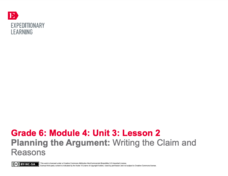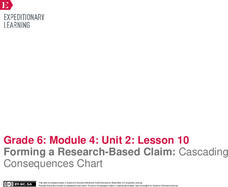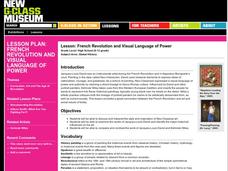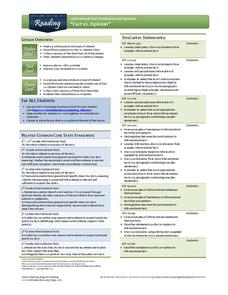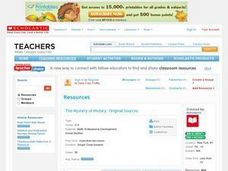EngageNY
Making a Claim: Moon Shadow’s Point of View of the Immediate Aftermath
Body paragraphs are the building blocks of every essay. Pupils view and discuss a model essay using a rubric to evaluate one of its supporting paragraphs. Next, scholars use what they've learned to continue drafting their own literary...
EngageNY
Planning the Argument: Writing the Claim and Reasons
Step up! Using the resource, scholars discover the six steps to writing an effective position paper. Next, they work on a graphic organizer to begin planning their argument-based essays.
EngageNY
Forming a Research-Based Claim: Cascading Consequences Chart
Is it relevant? Scholars choose a resource from their folders and search for relevant information about the harmful and beneficial consequences of DDT. They mark benefits in one color and harmful effects with another color. They then add...
Curated OER
Pronouns
Students play a game. In this pronouns instructional activity, students watch a video and read a book about pronouns. Students review types of pronouns, fill in missing pronouns in sentences, read a newspaper article and find as many...
Sullivan County BOCES
Reading Closely Teacher Manual
Wolves are the subject of a series of images, informational texts, videos, websites, and narratives. The activities prompt learners to use close reading skills, including reading closely for textual details, making evidence-based claims,...
The New York Times
I Don’t Think So: Writing Effective Counterarguments
When it comes to writing effective arguments, writers must do more than simply make a claim, counterarguments must be considered. Aspiring writers analyze counterarguments in editorials, and then learn how to write counterarguments in...
EngageNY
End of Unit 2 Assessment: A Hosted Gallery Walk
Speak your mind. Scholars present their claims in groups of three. They use a presentation checklist as each member takes a turn. At the end of the lesson plan, pupils complete an End of Unit 2 Assessment: Presenting a Claim and Findings...
New Class Museum
Lesson: French Revolution and Visual Language of Power
Take a look at the French Revolution and neo-classic art, then compare it to current social issues and contemporary art. Kids analyze several pieces painted by Jacques-Louis David in regard to style and subject then compare them to...
Curated OER
Defining Love
After reading and discussing Love Medicine by Louise Erdrich, pupils compare/contrast the concept/theme of love within several multiple pieces of literature. They must support their claims with textual evidence. In addition, they analyze...
For the Teachers
Fact vs. Opinion
Many informational texts are written as factual, but can your learners determine when an opinion is presented as fact? Have your kids read several articles on the same topic and record the statements that contain either facts or...
Annenberg Foundation
Student Voices
Whether it's an election year or not, a unit on voting patterns and political campaigns will awaken the civic pride in your high school citizens. Divided into six parts, the curriculum covers various facets of an election, including...
Fluence Learning
Writing an Argument: Free Speech
How do you assess whether pupils have mastered certain concepts and skills? Designing a performance task that asks learners to demonstrate their skills and providing writers with a rubric that identifies these skills and provides...
Curated OER
The Mystery of History-Original Sources
Students research the events surrounding the Alamo in 1863, and explore the differences between primary and secondary sources of information. They brainstorm lists of items used to research a subject and categorize them as primary or...
Curated OER
Writing Effective Thesis Statements and Introductory Paragraphs for Research Papers
After reading on the topic of their paper, high schoolers work in pairs to assess how to write powerful, precise thesis statements. The introduction contains three statements: a universal statement, a bridge statement, and a thesis...
Curated OER
Massive Migrations
Here is an exciting exploration of a fascinating topic for your emerging ecologists: bird migration! They begin by visiting the US Fish & Wildlife Service website to discover which Arctic birds come to their areas. They are assigned...
Curated OER
Fact or Fantasy?
Are we alone in the universe? This brief informational text on extraterrestrial theory has been split into seven sections to help scholars practice note taking. They read the statements, underlining key words. Then, using the graphic...
Curated OER
What Are the Advantages and Disadvantages of Conforming?
Dive into Arthur Miller’s The Crucible and determine what it means to conform in society, and discuss as a group with the thoughts and plans available in these documents. Included are multiple activities and brain targets that form the...
Space Awareness
The Big Meltdown
Explore the world (our world) of melting ice caps. Why are these caps melting? What is the effect of melting ice caps? Dive into the ever-present issue of global warming with a resource that has learners looking at data and participating...
Channel Islands Film
Arlington Springs Man: Lesson Plan 4
West of the West's documentary Arlington Springs Man introduces viewers to the remarkable finds on Santa Rosa Island. Archaeologist have discovered on this small island that is part of the Channel island chain, human and pygmy mammoth...
Reading Through History
Patriots and Loyalists
Patriots versus Loyalists, a huge divide during the Revolutionary War in what would become the United States of America. An informative resource includes both direct instruction about the two groups and a quiz pupils take after reading...
University of California
Impact of the California Missions on Native Americans
While the Spanish claimed to bring civilization to California indigenous peoples, in reality, they also brought violence and forced assimilation to European values. Primary sources, such as the reports of Catholic priests and Europeans...
EngageNY
Applying Research Skills: “Rachel Carson: Environmentalist and Writer”
It's important to cite sources! Scholars take a closer look at their research about DDT by examining how to cite sources. Learners take turns sharing information that would be used to cite sources to complement Rachel Carson:...
EngageNY
Interpreting, Integrating, and Sharing Information about DDT: Using Cascading Consequences and Fishbowl Protocol
What is your interpretation? Scholars look at their Cascading Consequences Charts and interpret the information they have gathered. Learners match claims with evidence and then watch a video. At the end, they carry out a fishbowl...
Curated OER
The Argument
After brainstorming, middle schoolers write an expository essay for a writing project. They focus on supporting points, organization, and writing conventions to develop a well-integrated paper. In addition, they revise, proofread and...



